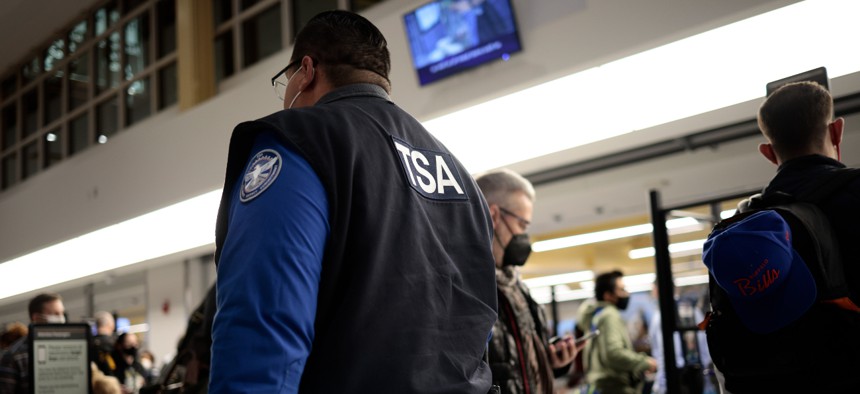
For years, the agency has suffered from low morale and retention. Anna Moneymaker/Getty Images
A Union Is Urging Support for TSA Workforce Reform in the Defense Policy Bill
The American Federation of Government Employees also said they oppose a plan to delay the Defense Department’s return to one-year probationary periods for new employees.
The nation’s largest federal employee union on Thursday asked lawmakers negotiating over the annual defense policy bill to support language reforming the Transportation Security Administration’s workforce policies and to block a provision that would delay the end of the Defense Department’s two-year probationary period for new employees.
The National Defense Authorization Act’s status as a must-pass annual bill means it is often a vehicle used to pass legislation that affects federal workers across government. In recent years, it was used to approve—and later fix a mistake in—paid parental leave for the federal workforce, among other policy changes.
The House version of the fiscal 2023 NDAA, which passed last month, included language barring future presidents from unilaterally reviving efforts to reclassify federal jobs outside of the competitive service, like the Trump administration’s abortive effort to create a new Schedule F for employees in policy-related positions, as well as the text of a bill applying Title 5 of the U.S. Code to TSA’s workforce, providing them full civil service protections.
For years, the agency has suffered from low morale and retention, and employees there are paid significantly lower than their counterparts elsewhere in government. They also have abridged collective bargaining rights.
In a letter to the leadership of the Senate and House Armed Services committees, the American Federation of Government Employees urged the lawmakers to retain the provision reforming TSA’s workforce policies as they negotiate the final version of the bill this fall. The Senate version of the bill (S. 4543), introduced last month, currently does not include the text of the Rights of the TSA Workforce Act in its latest public draft.
“The TSA workforce is among our first lines of homeland defense, and recruitment and retention of a quality workforce is greatly enhanced by affording this workforce the same Title 5 personnel rights as the federal government and most of the workforce in the Department of Defense,” wrote Daniel Horowitz, AFGE’s deputy director of legislation. “This is a bipartisan bill that reflects TSA input.”
Horowitz noted that in addition to lower starting salaries, transportation security officers take much longer to advance through a pay band than most other federal employees—while advancing to the top step of a pay grade in the General Schedule takes 18 years, the same ascent through a TSA pay band takes 30 years.
AFGE also urged lawmakers to get rid of a Senate provision that would delay the end of the Defense Department’s two-year probationary period for new hires. Originally enacted as part of the fiscal 2022 NDAA last December, the reversion to a one-year period before which new Pentagon employees obtain full civil service protections was scheduled to go in effect on Dec. 31, but that was contingent on a report from the Defense Department that officials failed to submit.
“We understand that the pretext being used to reverse what was agreed to in last year’s conference negotiations is the failure of the undersecretary of defense [for] personnel and readiness to provide the required report to Congress,” the union wrote. “Rather than withholding funds from [the agency] similar to what the ]Senate Armed Services Committee] has done in other areas of their markup for delinquent reports, this provision simply rewards and incentivizes continued delays in reporting for those elements of the [agency] who want to retain the two-year probationary period out of administrative convenience and lassitude.”







